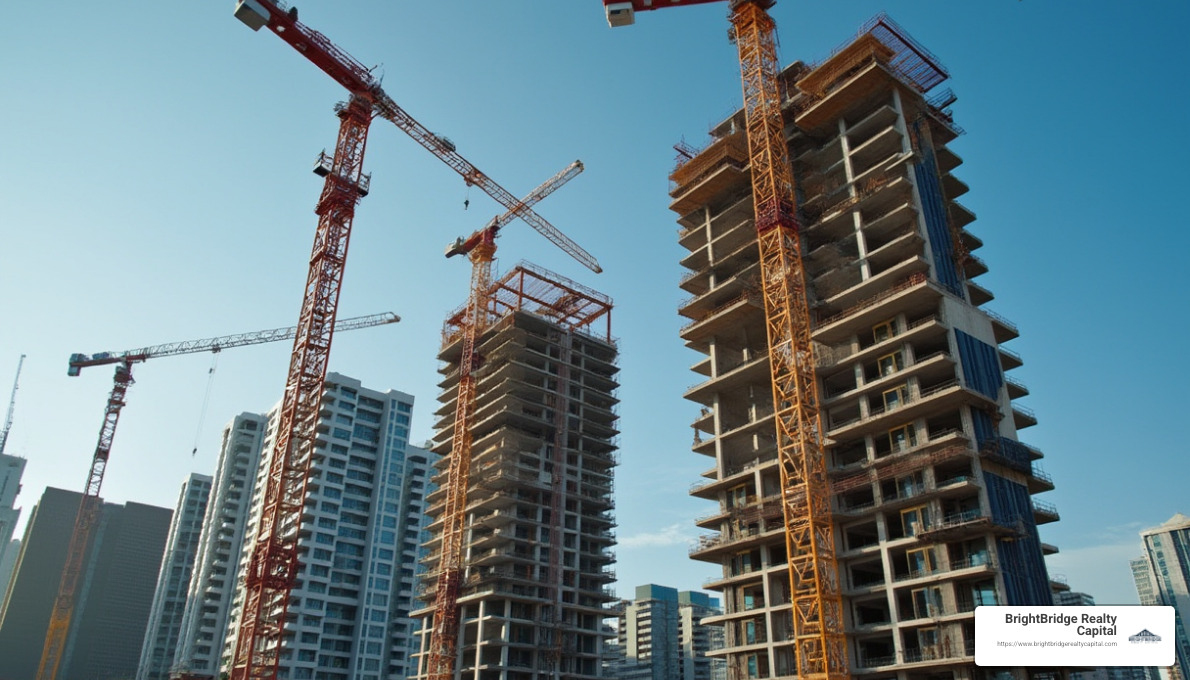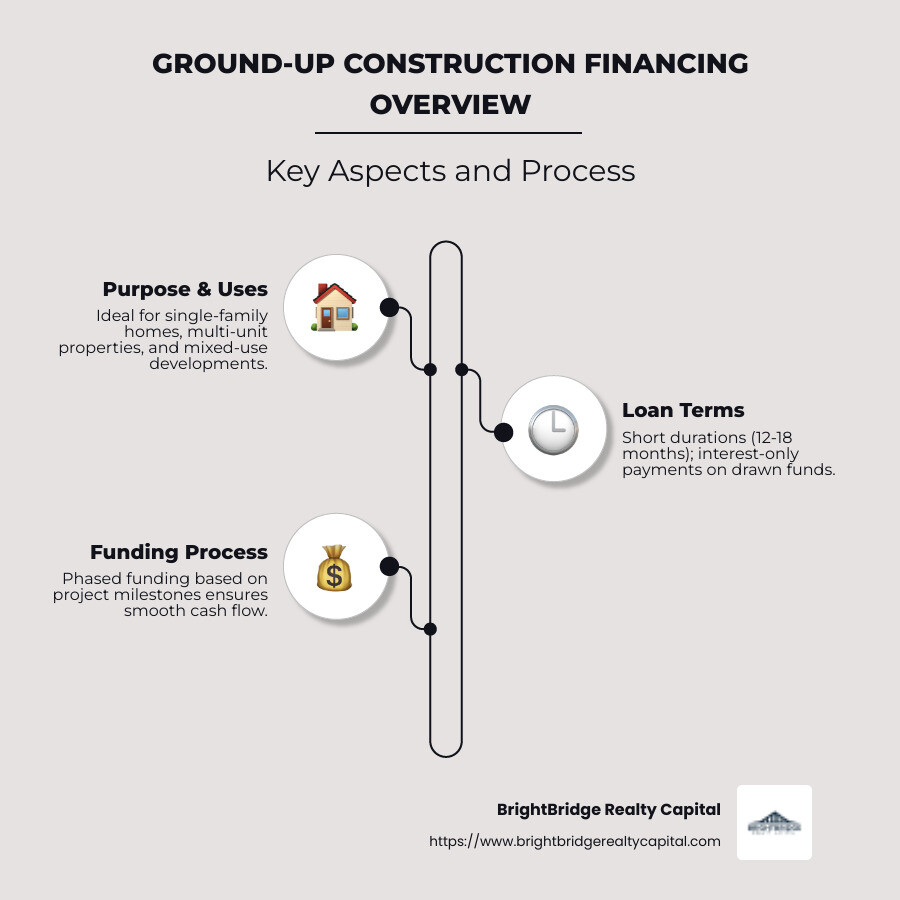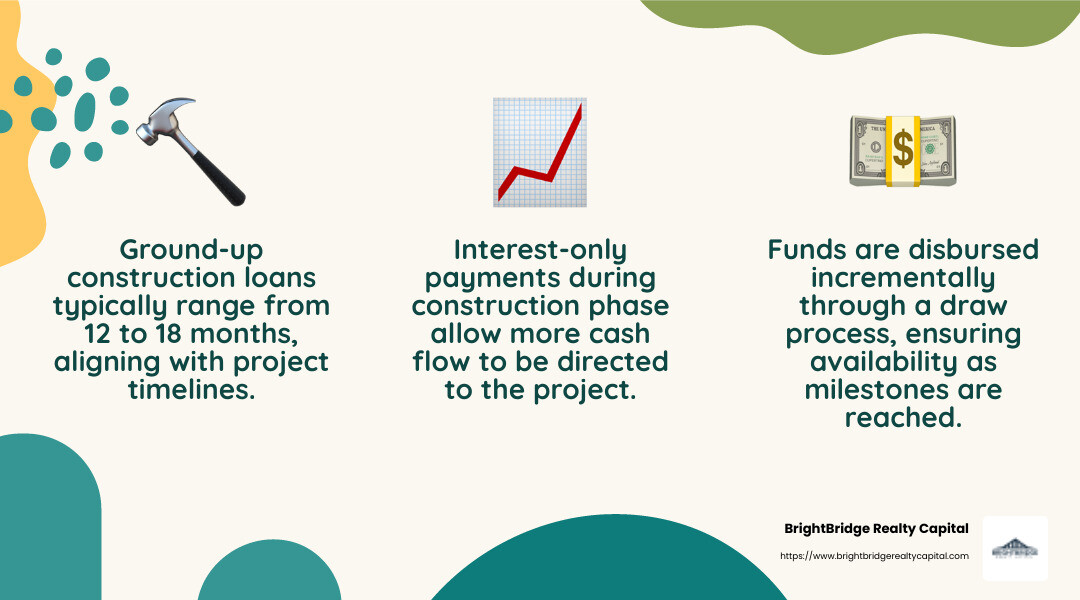From Ground to Glory: Navigating Ground-Up Construction Financing

Ground-up construction financing has revolutionized the way real estate investors approach development projects. Unlike traditional mortgages, these specialized loans are designed to fund new builds from the ground up, covering the costs of land acquisition, materials, and labor.
Key Aspects of Ground-Up Construction Financing:
- Purpose: Ideal for single-family homes, multi-unit properties, and mixed-use developments.
- Terms: Short durations (12-18 months); interest-only payments on drawn funds.
- Process: Phased funding, based on project milestones.
In a rapidly evolving real estate landscape, having access to quick, flexible financing solutions is crucial. At BrightBridge Realty Capital, we recognize the problems investors face when seeking reliable funding. Our loan programs are custom to support ambitious developments, ensuring you can focus on building, not bureaucratic delays.
Explore the benefits of stress-free financing and let your real estate visions become a reality with our expertise.

Terms related to ground-up construction financing:
Understanding Ground-Up Construction Financing
Ground-up construction financing is a comprehensive and flexible solution for real estate developers. It ensures every aspect of a project, from inception to completion, is financially covered. Let's dig into the key features and benefits of these loans.
Key Features of Ground-Up Construction Loans
Short-Term Loans:
Ground-up construction loans typically have a short duration, usually between 12 to 18 months. This short-term nature aligns with the construction timeline, providing the necessary funds right when you need them.
Draw Process:
Instead of receiving a lump sum, funds are disbursed incrementally through a draw process. This means you get money as you hit specific construction milestones. It keeps the project on track and ensures funds are available as needed.
Interest-Only Payments:
During the construction phase, borrowers only pay interest on the funds drawn. This keeps payments manageable and allows more cash flow to be directed towards the project itself.

Benefits of Ground-Up Construction Financing
End-to-End Financing:
These loans cover everything from land purchase to the last nail in the build. This comprehensive approach simplifies the financing process and ensures you don't have to juggle multiple funding sources.
Simplified Documentation:
Many lenders, including BrightBridge Realty Capital, offer streamlined documentation processes. This means less paperwork and faster approvals, letting you focus on what matters—building.
Custom Solutions:
Every project is unique, and so are its financial needs. Ground-up construction loans can be custom to meet specific project requirements, accommodating various types of developments like single-family homes or multi-unit properties.
In a nutshell, ground-up construction financing provides the necessary support and flexibility for successful real estate development. By focusing on the specific needs of your project, these loans ensure a smoother path from blueprint to building.

Next, we’ll explore the qualifications and requirements needed to secure a ground-up construction loan, ensuring your project is set up for success.
Qualifications and Requirements
Securing a ground-up construction financing loan involves meeting specific qualifications and requirements. Here’s what you need to know to prepare for a successful application.
Essential Documentation
Credit Score:
A strong credit score is crucial. Most lenders require a minimum score of 680, but a score of 720 or higher increases your chances of approval. This shows lenders that you have a history of managing debt responsibly.
Income Verification:
Lenders need proof of stable income to ensure you can handle the loan payments. Be ready to provide pay stubs, bank statements, or other financial documents that demonstrate your annual income.
Down Payment:
You'll typically need a down payment of at least 20% of the total project cost. Some lenders may require up to 30%. This upfront investment shows your commitment and reduces the lender’s risk.
Project Plans and Budgets:
Detailed project plans and budgets are essential. This includes blueprints, building specifications, and a detailed line-item budget. Having these documents ready not only helps in getting the loan approved but also keeps the project organized.
Contractor Agreements:
Signed contracts with your builder or contractor are necessary. These should outline the scope of work, timelines, and change order provisions. This transparency helps in managing expectations and avoiding conflicts during the build.
Builder and Contractor Approval
Licensed Builders:
Your builder must be licensed and qualified. Lenders often require proof of licensing as a part of their approval process. This ensures the builder is legally permitted to carry out the construction work.
Insurance Certificates:
Providing insurance certificates is crucial. They demonstrate that the builder and contractors are covered in case of accidents or damages during construction. This protects both you and the lender from unforeseen liabilities.
Financial Stability:
Lenders will assess the financial stability of your builder or contractor. This might involve reviewing financial statements or past project successes. A financially stable builder is less likely to run into problems that could delay or derail your project.
Meeting these qualifications and requirements is a significant step toward securing your ground-up construction loan. With proper preparation, you can ensure a smoother application process and set your project up for success.
Next, we’ll dive into the loan process itself, exploring pre-qualification, milestone-based draws, and loan conversion.
The Loan Process
Pre-Qualification and Builder Assessment
Before you can secure ground-up construction financing, you need to go through the pre-qualification process. This step is crucial as it helps determine your eligibility and sets the foundation for your loan application.
Experience Requirements:
Lenders often prefer borrowers with some level of construction experience. However, if you're new to this, partnering with an experienced and reputable builder can bolster your application. Your builder's track record and financial stability will be closely evaluated, as these factors play a significant role in the lender's decision-making process.
Project Evaluation:
A thorough evaluation of your project is necessary. Lenders will review your detailed project plans, budgets, and timelines. This evaluation ensures that the project is viable and that the funds will be used effectively. A well-prepared project plan not only speeds up the approval process but also demonstrates your commitment and preparedness.
Milestone-Based Draw Schedules
Once you're pre-qualified, the loan moves into the funding stage, which is structured around milestone-based draws. This ensures that funds are released in stages, aligned with the progress of your project.
Incremental Funding:
Instead of receiving a lump sum, funds are disbursed incrementally. This method helps manage cash flow and ensures that money is available as needed for each phase of construction. It also minimizes risk for the lender by tying disbursements to project milestones.
Inspector Evaluations:
Before each draw is released, an inspector may evaluate the completed work to ensure it meets the agreed-upon standards and timelines. This step provides an additional layer of oversight and helps maintain quality throughout the construction process.
Loan Conversion:
Upon project completion, many construction loans offer the option to convert into a traditional mortgage. This conversion simplifies the repayment process by transitioning the short-term construction loan into a long-term mortgage, allowing you to focus on enjoying your new property.
Navigating the loan process can seem daunting, but understanding these steps helps ensure a smoother experience. Next, we’ll address some frequently asked questions about ground-up construction financing to further clarify the process.
Frequently Asked Questions about Ground-Up Construction Financing
What is the minimum credit score required?
To qualify for ground-up construction financing, you typically need a minimum credit score of 680. This score helps assure lenders of your creditworthiness. However, aiming for a score of 720 or higher can improve your chances of approval and potentially secure better loan terms. It's important to maintain a positive credit history, as this reflects your ability to manage debt responsibly.
Can these loans close in an LLC or business entity?
Yes, ground-up construction loans can indeed close in an LLC or business entity. This flexibility is beneficial for builders and developers who prefer to manage projects through a corporate structure. Closing in an LLC can also offer liability protection and potential tax advantages. Be sure to consult with a financial advisor to understand the implications for your specific situation.
Are permits required?
Yes, obtaining permits is a necessary step in the ground-up construction financing process. Permits ensure that your project complies with local building codes and regulations. They are crucial for maintaining safety standards and legal compliance. Before starting construction, you must secure all relevant permits from local authorities. This requirement is non-negotiable and is a key part of the loan approval process, ensuring that your project is both feasible and lawful.
Understanding these FAQs can help clarify some of the common concerns builders face when seeking financing. In the next section, we'll explore how BrightBridge Realty Capital can simplify your financing journey and support your construction goals.
Conclusion
At BrightBridge Realty Capital, we understand that ground-up construction financing can be complex. That's why we're committed to making the process as seamless as possible. Our approach is simple: provide quick funding with no unnecessary delays, so you can focus on what really matters—bringing your construction project to life.
We offer fast closings, often within a week, which means you can seize opportunities without waiting around. Our direct lending model eliminates intermediaries, ensuring competitive rates and a straightforward process. Whether you're building a single-family home or a multi-unit development, we're here to support you every step of the way.
With our customized real estate financing solutions, you can expect:
- Quick Funding: Get access to the funds you need swiftly, enabling you to start your project without delay.
- Seamless Process: Enjoy a hassle-free experience from application to closing, with expert guidance and support.
- Custom Solutions: Benefit from flexible terms that adapt to your specific project needs and goals.
For more information on how we can help fuel your next real estate venture, visit our Ground-Up Construction Financing page.
BrightBridge Realty Capital is here to turn your construction dreams into reality with ease and efficiency. Let's build something great together!


